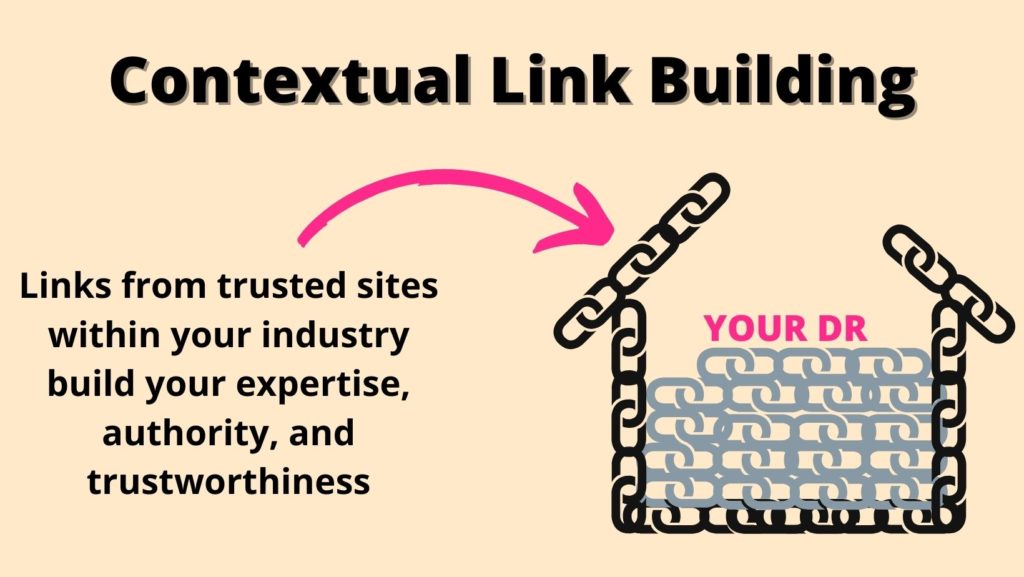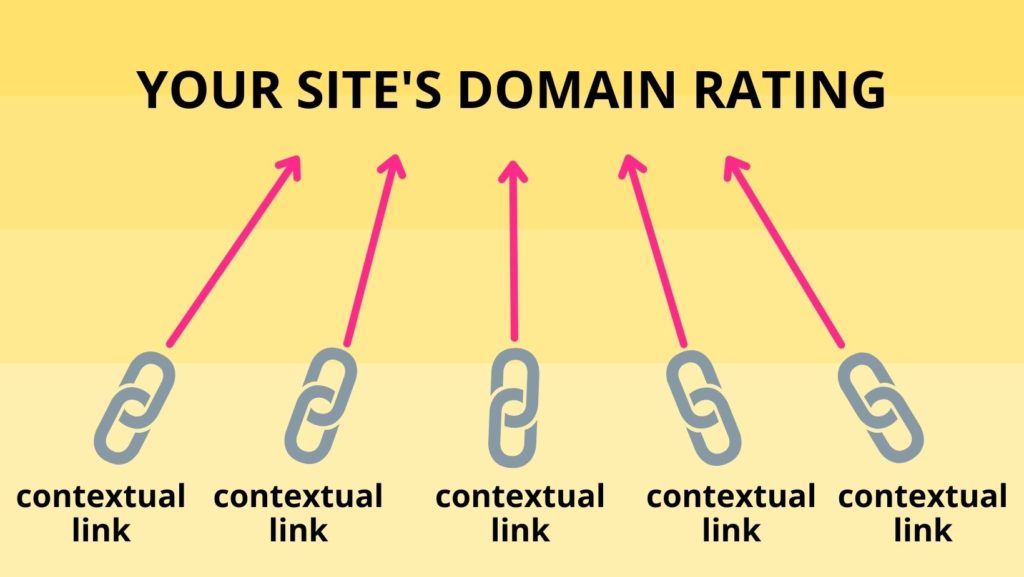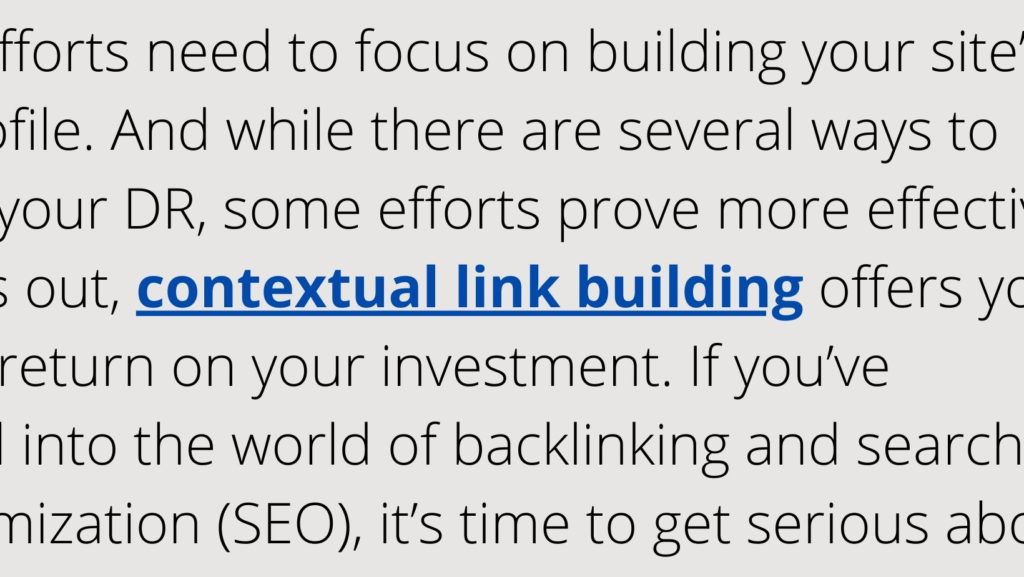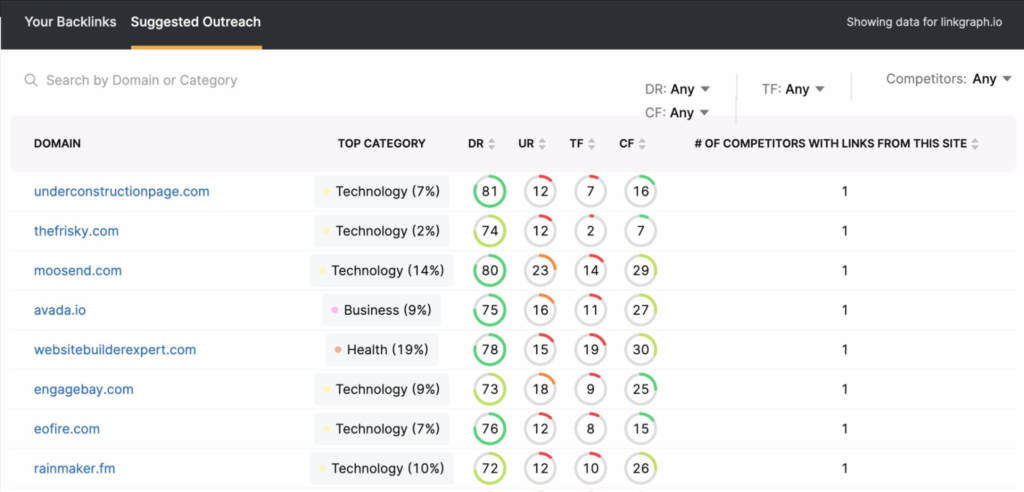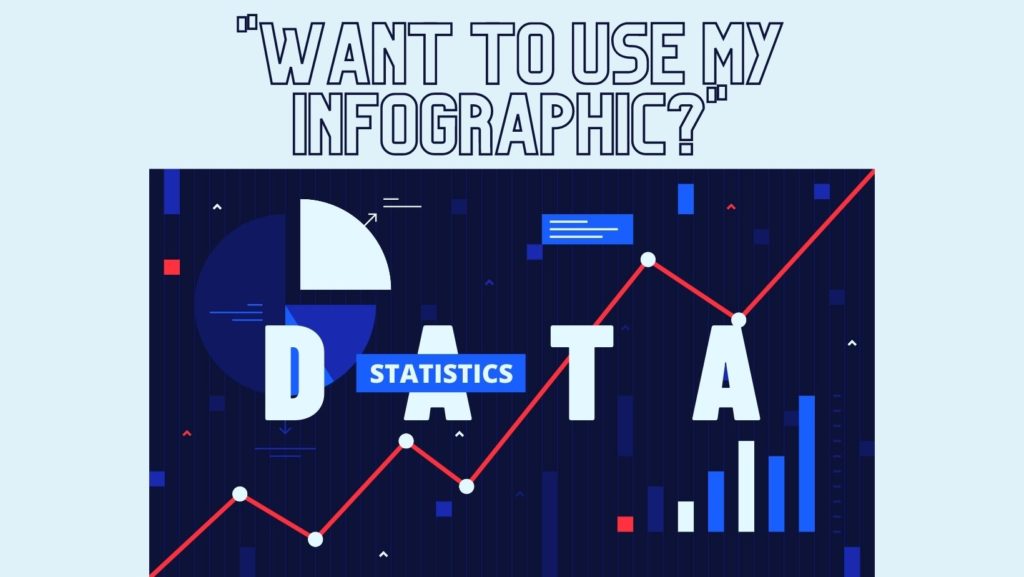7 Contextual Link-Building Tips & Techniques
There are several ways to strengthen your site authority, but it turns out that contextual link-building offers the biggest return on investment.
As you train for a marathon, you focus on one goal: finishing the race at your best time. But as you begin to train you will find that some training activities are more effective at building your stamina than others. Why the extended marathon metaphor? Building your site’s Domain Rating (DR) follows the same training principles: all of your efforts need to focus on building your site’s backlink profile. And while there are several ways to strengthen your DR, some efforts prove more effective. And, it turns out, contextual link-building offers you the biggest return on your investment.
If you’ve endeavored into the world of backlinking and search engine optimization (SEO), it’s time to get serious about getting the most out of each link. Using contextual backlinks does just this. We will explain how—and how you can put your best links forward with tips and tricks for better link building.
What Is a Contextual Link?
A contextual link is a link that is embedded in the main body of text, as opposed to a link that is part of a graphical element, like a button or an image.
Non-contextual links are those that appear outside of the main body of text. These are often in bylines, photo or graphic captions, or in author bios.
What Is Contextual Link Building
Contextual link building is the process of earning links to your website by providing valuable content and resources to other websites. In order to be successful, you must produce high-quality content that is relevant to your target audience and provides a valuable resource for them.
When you do this, other websites will be more likely to link to your content, providing you with valuable links that can help improve your website’s search engine rankings. How? Through E-A-T.
E-A-T stands for Expertise, Authority, and Trustworthiness. And these are ranking factors for Google!
How Does Contextual Link Benefit SEO?
Contextual links are beneficial for SEO because they help improve the relevancy of a website’s content. Relevancy is a key factor in Google’s search algorithm, so by adding contextual links to your website, you can improve your website’s rank in search engine results pages (SERPs). Additionally, contextual links can help improve click-through rates (CTRs) and drive more traffic to your website.
When your site shows up in search results, you receive more traffic to your website. And that traffic creates perpetual effects of:
- Greater search visibility in the long term
- A stronger brand reputation
- Perceived trustworthiness from visitors
- The opportunity to accept guest posts to build your content library
In fact, because backlinks are such a powerful SEO tool, Ahrefs invented the Domain Rating metric, which measures the strength of a site’s backlink profile.
Curious how your site compares to your competitors? Use our Backlink Analyzer to find out.
How Does Contextual Link-Building Compare to Other Link Building Strategies?
Unlike links in a byline or author bio, contextual links are font-and-center for readers–and by nature of being within an article they’re reading, you know the traffic you receive from the said link is more ‘qualified.’
Relevant backlinks also help Google better understand your site and the linked page’s content through the process of annotation text analysis. During this process, Google pulls NLP data from the text surrounding a hyperlink–and when your hyperlink is in the midst of a passage, Google’s NLP algorithms have more information to work with.
7 Link-Building Strategies for Contextual Backlinks
When it comes to backlinking, you often way to use a multi-faceted approach. You don’t want o put all your links in one basket, after all. Not only will selecting several of these approaches likely increase the number of backlinks you’re able to obtain, but they also provide you with a diversity of contextual backlinks types.
1. Guest Blogging
Guest blog posts are one of the most common ways for sites to obtain backlinks. What makes it a bit easier than other methods? Well, they’re a win-win for the author and the publishing site. The author gets to place external links to their site, thereby increasing their backlink profile, and the publisher gets high-quality content for their site.
How to Solicit Publishers for Guest Blog Post Opportunities
To find the right relevant sites for your inbound links, you want to research your industry. Find out where readers are going to find the latest news and what sites are considered the most authoritative.
You can easily do this with the Search Atlas Suggested Outreach report.
Once you’ve identified which sites you want to reach out to, you can A) Prepare content to pitch to them or B) Pitch topics for potential content. Option A often provides better results. Keep in mind as you pitch, that your focus should always be relationship building, so even if you’re declined, keep in touch with them. They may change their mind in the future.
How to Integrate Your Links in Guest Posts
If you find a website to publish guest blogs on, be sure to follow their webmaster’s blog guidelines. Some sites do not allow contextual links while others have a nofollow policy, which means the link juice from the site will not ‘count’ as Google indexes the web page.
To make the most of your contextual link, you will want to be strategic about how you incorporate it into the text. To do so, always:
- Never provide sites with low-quality content–always strive to provide the best quality content. Doing so gives you a higher chance of becoming a preferred guest poster
- Follow anchor-text best practices, including use of your keyword research
- Link to relevant content on your site, cornerstone content if possible
- Be mindful of using relevant Focus Terms for annotation text value–use descriptive phrases nearby your anchor text and throughout the piece
- Use a diversity of anchor text from one post to another
- Never force a link into content if it doesn’t make sense there
- Do not insert an excessive number of text links
It’s also courteous to include some internal links to the publishing site’s content throughout the piece.
2. Create Linkable Assets
You don’t have to be the best writer to provide linkable content for backlinking opportunities. In fact, you can earn backlinks by writing one guest post.
Instead of reaching out to websites with high Domain Authority with blog content, offer infographics, original research, video content, or other unique content types. To receive contextual backlinks from these assets, you can offer to provide written descriptions or written analyses of the related data.
Another possibility is to ask the website owner to provide a contextual backlink in exchange for use of the asset you’re providing. If you choose this option, it’s appropriate to ask for a link to a specific page on your site. Once you’ve established a relationship with the website owner, you can even request links to product pages.
3. Build Your Brand Name Through Freebies
Everyone loves to receive something for free. And when people do receive freebies, do you know what they do? Share their good fortune on social media and word-of-mouth.
You don’t have to send out random products to achieve backlinks from freebie campaigns. All you have to do is include a ‘bonus’ or “lagniappe” as they say in Louisiana, in your customers’ orders.
These freebies can include:
- Physical items like stickers, calendars, or pens
- Free trials for related digital pr products
- A free upgrade on their next product
4. Social Media Influencer Outreach
Social media influencers offer a unique way to obtain links from industry leaders and trend-setters. They’re also a great way to increase traffic to your site in order to get noticed by Google. They’re also well versed in content promotion, so you’re investing in their industry reputation and PR capabilities.
Influencers often have their own websites where you can become a featured product, service, or website. A vetted influencer’s brand mention and contextual links can do wonders for your direct traffic, search rankings, organic traffic, and sales.
When contacting influencers, always clarify if they offer a contract and what the terms will be. Be sure the influencer is recognized within your niche to ensure the best quality relevant backlinks.
Expert Tip
In addition to seeking content links on an influencer’s website, consider asking the influencer to guest post on your blog. This not only increases traffic to your website but it also:
- Directs traffic to high-value internal links
- Improves your blog’s reputation
- Provide a diversity of voice and insight to your blog
- Creates one more opportunity to target long-tail keywords
5. Create the News
You don’t have to perform outreach if you can create content other sites want to link to. By building industry-leading content that provides breakthrough insight, you can obtain organic backlinks without breaking Google Webmaster Guidelines.
To produce the high quality content you need to encourage organic link building, you want to immerse yourself in niche forums and industry news. You also want to gather as much original research as possible. Finally, you want to attend conferences where presentation and industry conversation can spark ideas for fresh topics and content angles.
Why This Approach Works
Google wants to show their users the best Google search results for every query. To do so, Google uses freshness algorithms to determine the best new content for some searchers. This is a ranking factor that promotes newer content for some search queries.
Additionally, users are more likely to select pages from the SERPs with a more recent publication date (thereby increasing your click-through rate).
6. Become a Podcast Guests or Start Your Own
Podcasts are an excellent way to spread your love of your industry and unique knowledge (of that of the site owner). Podcasts are also an easy way to incorporate relevant links into high-value content.
While starting your own podcast can be quite a hefty undertaking, being a guest on someone else’s podcast is easier than most people realize. Podcast producers and hosts are always looking for a fresh take on topics and people to interview. Plus, podcasts can bring your company more brand awareness while usually bring pretty fun.
7. Use a Premium Link Building Service
When it comes to link-building services, they can truly run the gamut of quality. And this quality often reflects the impact their efforts will have on your site’s search engine visibility. In fact, if you choose the wrong link-building company, you may wind up expelled from the SERPs.
So, if you’re going to spend your money on a backlink service or SEO agency, be sure to invest that money where you will receive the most link juice. Only hire an SEO company willing to embed your links in relevant content with diverse anchor texts.
Additionally, you want to be sure your links wind up on sites that are considered authoritative sources. Confirm that your link-building agency is placing your link on sites with a domain authority of 50 or higher and on pages with a high PR.
Contextual Link-Building: Your Link to Better Search Visibility
It’s time to begin your contextual link building campaign. As you venture into the world of link-building, keep in mind it takes time. You should begin to see your hard work pay off and site achieve higher search rankings within a few months, though.
Whether you hire a link-building service, content writer, or DIY your contextual link strategy, be sure you always aim for quality links that will stand the test of time. And don’t be tempted to secure link placements for non-relevant backlinks–these could hurt your Google ranking in the long term.
Need help with keyword research, increasing your organic traffic or determining link value? LinkGraph is a trusted SEO agency that specializes in contextual link building services. We can help you obtain backlinks from high domain authority sites to your cornerstone content. Contact us today to learn more.












































































